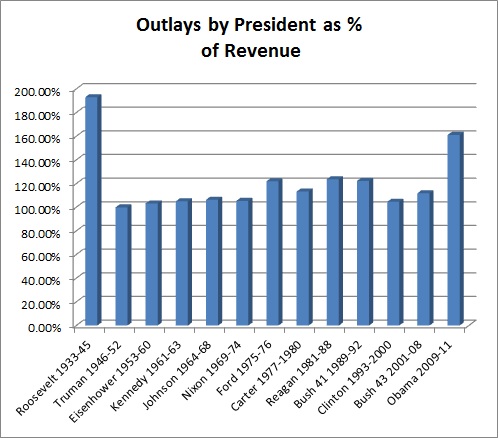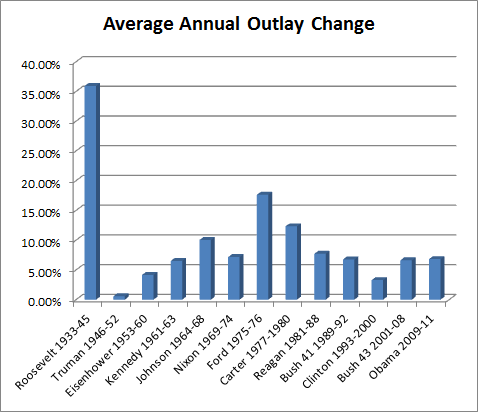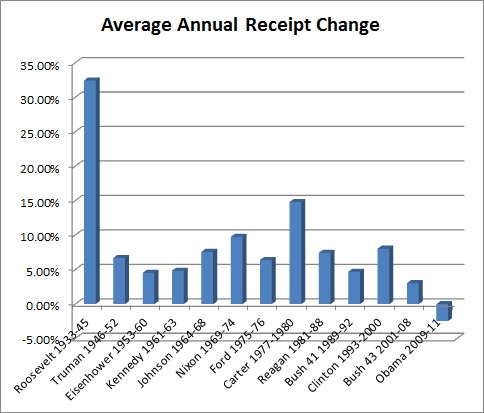
So a friend of mine said to me the other day, "I have no doubt he's well-intentioned, but Obama is spending us into the poor house." I hear such things often from friends and acquaintances and rather than choose to run with a different crowd I try to listen to what my delightfully misinformed confreres have to say then set about proving them wrong. It's a wonder I have any friends at all. I wouldn't put up with some effete snot pointing out why everything I believe is wrong.
About Obama's spending, my conservative friends are in plentiful company. It seems everyone on the right believes (or at least wants us to believe) that Washington spending is out of control, that it's the president's fault and that if we don't do something about it... I'm not really sure about that but it must be pretty calamitous, like flocks of winged lemurs will hurl anthrax spores down upon us and imps will rise from the fiery deep to feast upon our purpling flesh. If not that, then something else equally terrifying because roughly half the country is alarmed as all get out by this president and his wanton fiscal largess.
Well friends, I did some checking and yes, the federal government under Barack Obama's watch has spent a whole bunch of money. That much I'll concede. What I won't concede is that it has spent too much.
For starters, presidents don't create budgets or spend money without the consent of Congress, but for the sake of easy discussion, let's talk as if they do. Given that, if one goes all the way back to 1933, there have been 13 U.S. presidents and all but one of them has spent more money than he took in. That one was Harry Truman and during most of his seven years he was downsizing after World War II. Every other president in the modern era has spent more money than he had. That's how it works at the White House.
Roosevelt himself spent, on average, a whopping 93% more money than he took in each year during his 13 years in office. No other president has come close to that mark, but aside from Truman, who underspent his revenue an average of .19% per year, they've all spent what they didn't have. Here's a chart:

Source: http://www.whitehouse.gov/omb/budget/Historicals
Note: Roosevelt took office in March 1933. All others took office in January the year following their election with the exceptions of Truman, who assumed office in April 1945, Johnson, who assumed office in November 1963 and Ford, who assumed office in August 1974.
In his first three years, President Obama's outlays exceeded his receipts by an average of 61.1% per year, by far the biggest budget gap since Roosevelt. Between those two presidencies the biggest deficit spenders were Ronald Reagan, at an annual average of 23.57%, George H.W. Bush, at 22.4%, and Gerald Ford, at 21.91%. When it comes to spending what he doesn't have, Obama is in rarefied company.
However, there are two sides to a budget -- outlays on one side and receipts on the other. So while it's true that the current president has a big gap, one can't conclude necessarily that his spending is too high. It could be that his income is too low. Let's consider that.
OUTLAYS
Federal spending growth is not a linear function, it's exponential. In a dizzying Malthusian maelstrom the total outlays of the federal government have more than doubled in just 11 years. Such is the case for two reasons. First, spending increases build on themselves. If I spend 5% more this year than last year, and 5% more next year than this year and so on, at the end of five years I'll not be spending 25% more than when I started, I'll be spending 27.6% more. If I keep it up, at the end of 20 years I'll be spending 265% more than when I began. It's the problem of compounding, rather like the interest on your credit card balance that keeps you from ever making a real dent in your debt despite timely payments.
Secondly, to do what it did last year, this year the government must spend more actual dollars because those dollars are worth less than last year, or at least typically they are. And thus what FDR could do for a dollar in 1933 would cost Obama $17.54. Due to the shrinking purchasing power of a dollar one could argue that John Kennedy spent 7.5 times as much in 1961 as the official record shows. However, even adjusting for that fact, Obama still spent nearly five times more last year than Kennedy did 50 years earlier and that is due to the first problem with spending, exponential growth.
For all intents and purposes, every president spends more each year than he did the year before. The last time a president actually decreased spending from one year to the next was in 1965, when Lyndon Johnson spent $300 million less than in 1964. The last president who left office spending less than when he came in was Warren Harding in 1923. Spending growth is a fact of presidential life no matter what any candidate tells you.
Under the current president federal spending has increased at an average annual rate of 6.81%, marginally higher than under George W. Bush who increased spending an average of 6.62% per year for eight years. In historical terms, Obama's spending has increased at well less than the average annual rate of 9.6% for all presidents back to Roosevelt. Here's a second chart:

Excluding Truman and Roosevelt, who occupy the polar extremes in terms of changes in federal outlays from year to year, Obama is right in the middle of the pack. On the basis of spending alone, one could call him a moderate, a centrist, a mainstreamer. Spending under Obama has grown more slowly than under Presidents Nixon, Ford, Reagan and Bush 41, noted conservatives all. In fact, Obama would have increased spending less than Bush 43 as well if not for the fact that in one aberrant year, 2009, Obama increased spending on physical resources by an unheard of 74%. That year, you'll remember, was the year we shelled out $300 billion on TARP and some additional funds on bailouts and rescues of industries left in ruins by this president's predecessor. For a detailed look at presidential spending by function, check out Table 3.1 here.
The asymmetry between Candidate Obama and President Obama is what underlies my conviction that he might campaign like a liberal but he has governed like a conservative (and Congress has had more than a little bit to do with that). It's not just me. Nobel Prize-winning economist Paul Krugman believes nothing will help the current economy more or more rapidly than increased federal spending. As Julian Brookes wrote in the May issue of Rolling Stone,
"...[I]t worked in the late nineteen-thirties and forties, when the U.S. government started shelling out on the military in the build-up to World War II, bringing an abrupt end to years of economic misery and laying the foundation for decades of prosperity... It worked then, he says, and it will work now."
Krugman points out, "You could get a lot of stimulus, about $300 billion, just by providing aid to states and localities so they can reverse their budget cuts. That would create a million jobs, including those 300,000 schoolteachers that were laid off."
Whatever merits there may be to Krugman's argument, this president has not heeded them, or at least not acted on them.
RECEIPTS
President Obama's spending is not too high, but his revenue is definitely too low. Going back to 1933, federal receipts have grown at an average rate of 8.3% per year, more slowly than outlays but a respectable clip nonetheless. Under Bush 43, receipts grew at a sluggish average rate of just 3.04%. Still, that's astronomic growth compared to Obama's average annual decrease in receipts of -2.45%. Here's the last chart taken from Table 2.1.

No other president on our list has experienced a cumulative annual decrease in revenue. Prior to Obama, every president of the post-Depression era could at least partially offset spending increases with swelling federal coffers. Such was not the case during this president's first three years and there's a reason for that.
Other than Social Security -- which is principally off-budget anyway -- by far the largest share of total federal receipts comes from two sources, corporate income taxes and individual income taxes.
If the Dow Jones Industrial Average is any indication of corporate earnings (and it's not perfect), things must be good for corporations. The Dow closed on July 24 at over 12,617, which is 32 percent higher than it closed on the last day of 2008. In fact, it's just a shade off its record high. Things in Europe keep shaking up the markets a bit and every time Ben Bernanke talks to the Senate, investors run around not knowing whether to sh*t or go blind. But on the whole, the major corporations in America appear to be posting solid earnings. So it stands to reason that corporate income taxes should be considerably higher now than under Bush the Lesser, or so one would think.
And one would be wrong, way wrong. In 2008, corporate income taxes totaled $304 billion, down from their record high the year before of $370 billion. Over eight years, Bush saw corporate income taxes increase by an average annual rate of 1.8 percent. In his first three years Obama saw them plummet (see Table 2.1 linked above). In 2011, corporate income taxes totaled just $181 billion, less than 60 percent of their total during Bush's final year in office, which tells me that if I've got to be a person, boy howdy I want to be a corporation! Earn more money, pay fewer taxes -- that's the ticket.
Finally there are individual income taxes, which are down, naturally enough, since a goodly number of people aren't earning as much as they once did and many are earning nothing at all. To the credit of the industrious American people who keep trying to find work wherever they can, individual income tax receipts have increased since 2009. Last year they totaled $1.09 trillion, up 93 billion from the year before, accounting for just a tick over 47 percent of combined federal revenue. But they are still lower than in 2008 and 2007, for that matter. Bush saw individual income taxes grow by an average annual rate of 1.2 percent while Obama has seen them shrink by an annual rate of 3.1 percent. (Table 2.1)
And on that note I'll concede that Republicans, including some of my friends, are right about at least one thing; the most important task confronting this president or his successor is to stimulate job growth. Without more people working and earning more taxable income there's no hope of reducing the federal budget deficit.
About that, however, one should note that the kind of austerity recommended by most Republicans, a combination of tax and spending cuts, has never resulted in appreciable job growth or economic growth of any kind. In fact, the periods of this country's greatest job growth have corresponded with its highest top marginal income tax brackets, about which I've written previously.
SUMMARY
I'll probably have to admit to my conservative friends that when it comes to spending what he ain't got, President Obama's been on quite a tear. But if I admit that, I'll ask that they admit the simple truth that he has not spent any more than the norm for every president before him for almost 80 years. We can argue about some things, but about history, I think we ought to settle on facts. Numbers don't lie. Candidates might. A candidate might tell you what he thinks you want to hear then behind your back cut deals with billionaires. Numbers are firm. You can count on them to mean exactly what they say every time.
From my own perspective, I think what Barack Obama has spent and proposes to spend is far short of what's required to speedily right our federal ship of finance. I think history supports that view and I think Obama and his people probably know it. But they also probably know something they grudgingly accept, something on which their opponents rely: A significant share of American voters are more responsive to familiar rhetoric and 30-second sound bites than to mathematical truths and sound arguments. We're accustomed to hearing that all Democrats propose to spend too much money and many of us take it as an established truth, despite facts to the contrary.
That belief alone is sufficient to give life to the central Republican thesis, to wit, they'll stimulate the economy through sound fiscal policy. It's not the case but they've succeeded in persuading plenty of us that it is. As a result, new-fangled Democrats have taken a page out of the Republican playbook and today's fiscally-centrist Democrat bears no resemblance to Democrats of generations gone by. That's a risky tactic given what Truman once observed: Given a choice between a Republican and a Democrat acting like a Republican, folks might as well vote for the Republican.
At any rate, the choice this November appears to be between those who would do exactly the wrong things for our economy, cut taxes and reduce spending, and those who will do only a middling share of the right things, increase both. No matter. The choice we have is the only choice we have and as for me, I'll side with history. Someone taught me it's a good indicator of things to come.
Note on sources: All data referenced in this article is available at www.Whitehouse.gov. All historical tables used for this article and all other relevant federal financial data is available and downloadable as a single 368-page pdf file at this link.
